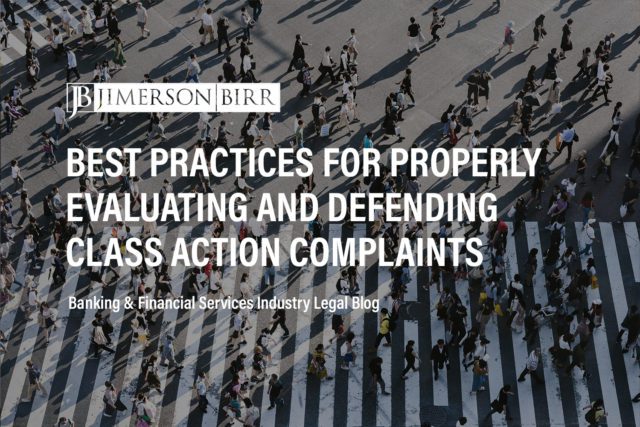What does obtaining early dismissal in class action litigation entail?
In class action litigation defense in Florida, obtaining early dismissals of the plaintiffs’ claims through motions to dismiss involves asserting defenses such as the statute of limitations, lack of standing or injury, or failure to state a claim. To achieve this, defense counsel must carefully assess the complaint and evaluate the viability of these defenses based on relevant Florida and federal cases, statutes, codes, rules of procedure, regulations, and secondary sources.
For Example, Florida courts have granted motions to dismiss in class action lawsuits alleging violations of the Florida Deceptive and Unfair Trade Practices Act, where the plaintiffs failed to establish standing due to a lack of injury. Nationwide, federal courts commonly dismiss class action complaints for failure to state a claim.
Need help with a class action litigation defense? Schedule your consultation today with a top class action defense attorney.
Which Florida and federal laws and regulations apply to obtaining early dismissal?
Laws relevant to obtaining early dismissal in class action litigation include the Florida Rules of Civil Procedure and federal rules such as the Federal Rules of Civil Procedure. For example, Rule 1.1420 of the Florida Rules of Civil Procedure governs motions to dismiss, specifying the grounds upon which a defendant can file a motion to dismiss, including failure to state a claim, lack of standing, or statute of limitations. Federal Rule of Civil Procedure 12(b) similarly provides for motions to dismiss on various grounds, such as lack of standing, failure to state a claim, and statute of limitations.
Additionally, each claim’s specific statute of limitations varies according to the nature of the cause of action, such as the four-year statute of limitations for breach of contract claims under Florida Statutes § 95.11(3)(k)7. Therefore, defense counsel must carefully assess the applicable laws and regulations to determine the best action to seek early dismissals in class action defense matters.
What are the strategic benefits of obtaining early dismissal?
Obtaining early dismissals of the named plaintiffs’ claims through motions to dismiss based on such defenses as the statute of limitations, lack of standing or injury, or failure to state a claim in class action litigation defense matters offers the following strategic benefits:
- Cost savings: Dismissing a class action lawsuit can save significant legal expenses by avoiding protracted litigation, including the costs associated with discovery, expert witnesses, and trial preparation.
- Reduced business disruption: Early dismissals minimize the time and resources a company must devote to defending the lawsuit, allowing it to focus on its core operations without distraction from ongoing litigation.
- Stronger negotiating position: Successfully obtaining a dismissal can strengthen the defendant’s position in any potential settlement negotiations with remaining plaintiffs, as the court’s decision may signal weaknesses in the plaintiffs’ case or increase the risk of an unfavorable outcome for the plaintiffs.
- Precedent-setting: A favorable ruling on a motion to dismiss can establish precedent in the jurisdiction, potentially discouraging future plaintiffs from pursuing similar claims against the defendant or other companies in the same industry.
- Public relations benefits: An early dismissal can help protect a company’s reputation by demonstrating that the plaintiffs’ claims were without merit or legally insufficient, which may mitigate any negative publicity associated with the lawsuit.
- Deterrent effect: Successfully defending against a class action lawsuit by obtaining an early dismissal can serve as a deterrent to other potential plaintiffs, signaling that the defendant is willing and able to mount an aggressive defense to protect its interests.
What steps should a class action defendant take to obtain early dismissal, and how will class action plaintiffs generally respond?
Class action defendants should follow these steps:
- Assess the viability of defenses: Review the complaint and identify potential defenses, such as the statute of limitations, lack of standing or injury, or failure to state a claim.
- Retain experienced counsel: Engage a Florida-based attorney with expertise in class action litigation defense to draft and file the motion to dismiss.
- Gather supporting evidence: Work with counsel to collect relevant documents, facts, and legal authorities to support the motion.
- Timely file the motion: Ensure the motion is filed within the applicable deadline under Florida and federal rules of civil procedure.
Class action plaintiffs typically respond by:
- Opposing the motion: Filing a written response to counter the defendant’s arguments and defend the sufficiency of their claims.
- Amending the complaint: If the court grants the motion to dismiss, plaintiffs may have the opportunity to amend their complaint to address the deficiencies identified by the court.
Legal defenses available against obtaining early dismissals include the following:
- Standing: Arguing that the plaintiff has suffered an injury-in-fact, which is traceable to the defendant’s actions and redressable by the court.
- Statute of limitations: Countering that the plaintiffs filed their claims within the applicable statutory time.
- Failure to state a claim: Demonstrating that the complaint contains sufficient factual allegations to state a plausible claim for relief.
- Preemption: Asserting that federal law preempts the plaintiffs’ state-law claims.
When a set of facts is appropriate to obtain early dismissal, there are many paths a claimant may take. We are value-based attorneys at Jimerson Birr, which means we look at each action with our clients from the point of view of costs and benefits while reducing liability. Then, based on our client’s objectives, we chart a path to seek appropriate remedies.
To determine whether a unique situation may necessitate litigation, please contact our office to set up your initial consultation.
Frequently Asked Questions
- Can a defendant file multiple motions to dismiss?
Yes, a defendant can file multiple motions to dismiss. However, they must be based on different grounds and filed within the applicable deadlines under Florida and federal rules of civil procedure.
- What happens if a motion to dismiss is granted in part and denied in part?
If a motion to dismiss is granted in part and denied in part, the dismissed claims will be removed from the case, while the remaining claims will proceed to the next stages of litigation, such as discovery and potential trial.
- Can a plaintiff appeal a dismissal granted on a motion to dismiss?
A plaintiff can appeal a dismissal granted on a motion to dismiss. However, they must follow the applicable rules for appealing a dismissal order in the relevant jurisdiction, including filing a notice of appeal and preparing an appellate brief.
Have more questions about an early dismissal-related situation?
Crucially, this overview of obtaining early dismissal in class action litigation does not begin to cover all the laws implicated by this issue or the factors that may compel the application of such laws. Every case is unique, and the laws can produce different outcomes depending on the individual circumstances.
Jimerson Birr attorneys guide our clients to help make informed decisions while ensuring their rights are respected and protected. Our lawyers are highly trained and experienced in the nuances of the law, so they can accurately interpret statutes and case law and holistically prepare individuals or companies for their legal endeavors. Through this intense personal investment and advocacy, our lawyers will help resolve the issue’s complicated legal problems efficiently and effectively.
Having a Jimerson Birr attorney on your side means securing a team of seasoned, multi-dimensional, cross-functional legal professionals. Whether it is a transaction, an operational issue, a regulatory challenge, or a contested legal predicament that may require court intervention, we remain a tireless advocate every step of the way. Being a value-added law firm means putting the client at the forefront of everything we do. We use our experience to help our clients navigate even the most complex problems and come out the other side triumphant.
If you want to understand your case, the merits of your claim or defense, potential monetary awards, or the amount of exposure you face, you should speak with a qualified Jimerson Birr lawyer. Our experienced team of attorneys is here to help. Call Jimerson Birr at (904) 389-0050 or use the contact form to schedule a consultation.


We live by our 7 Superior Service Commitments
- Conferring Client-Defined Value
- Efficient and Cost-Effective
- Accessibility
- Delivering an Experience While Delivering Results
- Meaningful and Enduring Partnership
- Exceptional Communication Based Upon Listening
- Accountability to Goals











